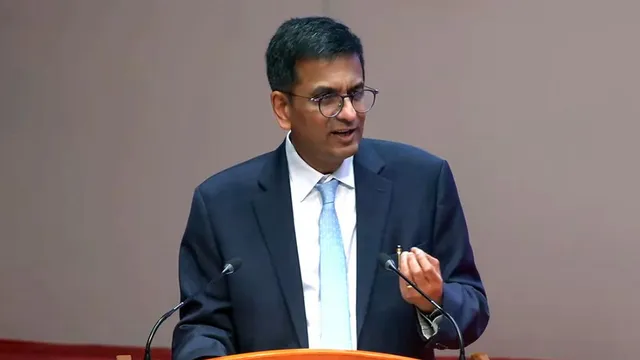- By Imran Zafar
- Thu, 13 Feb 2025 04:12 PM (IST)
- Source:JND
Former Chief Justice of India (CJI) DY Chandrachud dismissed allegations of political influence over the judiciary, asserting that India remains a vibrant democracy. In a recent interview on BBC’s Hardtalk, he responded to claims that Prime Minister Narendra Modi’s government in Centre exerted pressure on the courts to serve its interests.
Journalist Stephen Sackur referenced a New York Times editorial that suggested India was moving toward a "one-party state," with opposition leaders alleging judicial bias. Chandrachud refuted this claim, pointing to the 2024 Lok Sabha election results as proof that India’s democracy remains diverse and robust. He highlighted the success of regional parties in multiple states, demonstrating that governance in India is not centralised under one party.
Judiciary's Role In Protecting Civil Liberties
Addressing concerns over judicial independence, CJI Chandrachud emphasised that the Supreme Court has consistently upheld due process. He cited instances where bail was granted to political leaders and activists, reinforcing that the judiciary remains committed to safeguarding personal freedoms.
Responding to questions about Rahul Gandhi’s defamation case, Chandrachud reiterated that the Supreme Court had stayed the lower court’s ruling, allowing him to continue his political activities. He reaffirmed that the judiciary remains a protector of fundamental rights and personal liberties. "The Supreme Court has always stood at the forefront of defending personal freedoms, which is why the people of India continue to place their trust in us," he said.
In response to criticism regarding his interactions with Prime Minister Narendra Modi, including the latter’s visit to his residence for a religious event, Chandrachud dismissed any suggestion of impropriety. "Let’s not overanalyse basic courtesies between high constitutional functionaries," he said, asserting that such meetings do not affect judicial decisions.
Ex-CJI Defends Key Supreme Court Rulings
The former CJI defended several landmark judgments delivered under his tenure. He highlighted the Supreme Court’s verdict striking down the electoral bonds scheme, stating that the ruling was made before his meeting with the Prime Minister. Additionally, he pointed out that the judiciary had passed multiple rulings that were not favourable to the government, countering claims of bias.
On the issue of Article 370’s abrogation, Chandrachud maintained that the decision was constitutionally sound. "Article 370 was always intended as a transitional provision. The assumption at the birth of the Constitution was that it would eventually integrate with the rest of the legal framework," he explained. He also underscored the Supreme Court’s directive to hold elections in Jammu and Kashmir by September 30, 2024, reaffirming the importance of democratic processes in the region.
Indian Judiciary Dominated By Some Groups?
When questioned about the judiciary’s perceived elitism, particularly its dominance by upper-caste Hindu men, Chandrachud rejected the notion. He highlighted the increasing participation of women in the legal profession, particularly in the lower judiciary. "More than 50 per cent of new recruits in district courts are women, with some states reaching up to 70 per cent," he noted.
He explained that the higher judiciary reflects the composition of the legal profession from a decade ago. "As education and legal opportunities expand for women, we will see more gender diversity in the higher judiciary in the coming years," he said, emphasising that the legal system is evolving toward greater inclusivity.

